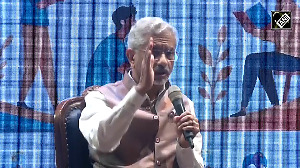Kumar Ketkar, editor of Loksatta, the largest-selling Marathi daily newspaper in Mumbai, is one of Maharashtra's most distinguished political analysts. On a visit to New Delhi he created a flutter when he argued, contrary to most opinion polls and surveys, that the Congress-Nationalist Congress Party alliance could lose the assembly election in Maharashtra.
Ketkar believes there is a tide against the Congress-NCP rule which can only be contained if rebel candidates were unsuccessful in dividing the Cong-NCP votes.
'Sena-BJP will win by default'
Before campaigning began in Maharashtra, I believe most voters had decided whom to vote for. I will not be surprised if an overwhelming number of voters vote against the ruling Congress-NCP government. This has been my view for the last two years.
Also Read: The Maharashtra Assembly Election
It will be absurd for the Congress-NCP to imagine that they will come back to power. The people are quite angry. The issues of malnutrition and suicides surfaced only a few months ago. I have been saying for the last two years that because of massive anti-incumbency, indifference of the government to people's problems, continuous problems inside the NCP and Congress, and problems between these two parties will not help them win again.
The infighting has demoralised the third and fourth ranks of the cadre. We should remember that elections are fought by the lower cadres and not by the leaders. Leaders only give speeches, give interviews to newspapers and appear on television, cadres never go on television. This is a discontented lot.
I have based my observations on the basis of these people who are in the midst of the action. I don't think the battlelines before and after the campaign have changed much. The only big difference is that Sonia Gandhi's Congress and the NCP have a pre-poll alliance. The BJP and Sena, too, have cemented their alliance but they never had many fundamental differences.
I think most pollsters and journalists are often wrong because we don't analyse the election from the perspective of the voters or from the eyes of the activists of different parties.
The government has shown complete indifference towards the people and their problems in the last five years. Their rule can be dubbed almost as non-performance. Nothing has happened in the last five years. And five years is a long time.
No one understands why one non-performing Congress chief minister was replaced by another non-performing CM. Non-performance of the Congress-NCP government has resulted in anti-incumbency. Other factors as I said above, are intra-Congress, intra-NCP and Congress-NCP feud.
The installation of a Congress led government in New Delhi could have helped the Congress-NCP in Maharashtra if the government in Maharashtra had acted with zest in promoting secularism and in implementing the people's programmes. Not in terms of slogans but in showing the comprehensive action for the problems of the state.
'Mumbai has ceased to be an industrial town. It's fast becoming a service centre'
In Maharashtra 40 percent of the people live in cities and their life is becoming miserable. City dwellers are very, very angry. In the last Lok Sabha election, the issues were absolutely different. In a state election, issues are far different.
Sugar, cotton and lack of industrial growth are three dominant issues in this election. The textures of these sectors has changed fundamentally.
The sugar industry in the state has hit its bottom. 150 sugar factories are in severe crisis. Cotton trade is facing problems and cotton farmers are angry.
Mumbai has ceased to be an industrial town. It Is fast becoming a service centre. Mumbai is the biggest call centre in the world now. It means that the Congress' industrial base has disappeared. The Muslims of Mumbai will most probably, vote for the Congress but they are not the swingers. Only in seven or eight assembly segments are the Muslims significant, otherwise they are spread out. Muslims are in no position to stop the tide.
I don't understand why the Congress should win!
Most pollsters and surveys are working on the 1999 figures when the NCP and Congress were divided and how the Congress and NCP's divided votes hit the Congress front badly. This time they are emphasising on the pre-poll alliance. I think this kind of simple addition of the Congress and NCP votes may not actually happen on the ground.
Sharad Pawar is in the twilight before the sunset. He is in his final days of his political career.
My point is that rebels are a known factor in this election but there are many dissatisfied activists from the Congress and NCP who are not working for their party or for their official candidates because they don't 'approve' of the leadership or the candidature.
In Vidarbha, people are against this government but the Congress will wrongly conclude that people have voted in favour of a separate Vidarbha movement. It will be a wrong conclusion.
In Maharashtra we will see the multiplier effect of this dissatisfaction. On an average, one will see seven to nine candidates contesting per constituency. The Congress or NCP candidate is fighting against the BJP or Sena candidate. Then, there is one rebel Congress and rebel NCP candidate. Then, you will find a rebel of the Congress or NCP who has officially joined the Republican Party, Samajawadi Party or Bhujan Samaj Party because they could not get a ticket from their own party.
The Dalits of Maharshtra are fed up with the RPI's leadership. It's an anti-incumbency within the Dalit party that is helping Mayawati. As such there is no independent Mayawati factor in Maharashtra.
In most places you will find a rebel in the fray who is fighting not to win but to sabotage someone's chances. If you observe the pattern of voting, a candidate who has earned the least votes would be cutting the Congress or NCP votes. His votes might be 1,500 but then all the losers above him are also cutting votes in such a manner that the BJP-Sena will benefit.
In the final analysis, the Congress might end up with more votes but will get lesser number of seats. First, second, third and fourth highest losers in the constituencies will cut the Congress votes, not the BJP's.
The undercutting of the vote pattern is such that if you add all the votes in favour of the Congress during the surveys then the verdict will be that the Congress-NCP is winning but in terms of seats the BJP-Sena may actually be winning.
I am aware that the BJP's morale has not picked up at all. But the Sena's morale is not low as it was three months ago.
Bal Thackeray is enthusiastic because of the non-performance of this government. But after the results, the BJP's morale will pick up. They are winning! I have seen the mood on the ground.
People may not vote for the Sena-BJP, but they will win by default. There is no popular wave in support of the BJP-Sena.
If my assessment is proved wrong it would only mean that the undercutting of votes of both the NCP-Congress was not as per my calculation. For the Congress, a large number of votes will come because of Sonia Gandhi. She and Prime Minister Manmohan Singh are the only trusted leaders. Sonia's personal credibility is very high. But she and Manmohan Singh are not state leaders. They represent the Centre. Wherever local issues are dominant they cannot help much.
Whichever party wins 135 seats of its own will form the government in Maharashtra. I give 115 to 125 seats to the Congress-NCP, the BJP-Sena should get 135 to 150 seats.
I expect Narayan Rane, not Uddhav Thackeray, to become the next chief minister.
The BJP will get a lifeline from this election win and Pramod Mahajan's stock will go up.
As told to Sheela Bhatt






 © 2025
© 2025